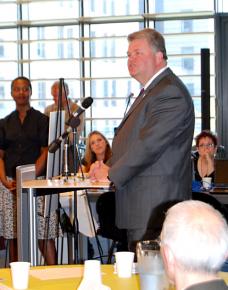Overflow crowd protests Seattle budget cuts
reports on opposition to city budget plans that will cut social services in Seattle.
SEVERAL HUNDRED people packed city council chambers and an overflow viewing room at Seattle City Hall on October 27 for a public hearing on the mayor's proposed budget.
Mayor Greg Nickels' proposed 2009 budget includes cuts to nearly every social service program. Providers and recipients of these services came out in full force to argue for the vital importance of these programs.
Lines began forming hours beforehand to sign up to speak, and a total of 130 organizations and individuals signed up for a hearing that lasted over five hours.
"We are here to keep our jobs," a caseworker at Safe Futures said in an interview. "The city budget would force the layoff of 75 caseworkers. Safe Futures keeps kids off the street and out of crime. If the city cuts the funding for Safe Futures, we will have hundreds of kids committing crimes."
The meeting turned out a large number of young people, including many youth who had benefited from counseling and job-training programs that are now on the chopping block. A spirited delegation from Seattle Teach for Youth held signs in the chamber, and several testified. Terrence Spring told council members, "If they weren't there, I'd probably be in jail or dead."

Twenty-five students from Bishop Blanchet High School came out, and hundreds more wrote letters to the city council in support of the St. Martin de Porres Shelter where they volunteer. The shelter needs only $40,000 from the city to keep running seven days a week. "We who have so much, who waste so much, have no right to take from those who have nothing," said one student.
Supporters of Nickelsville--a homeless encampment named in honor of Mayor Nickels, who has refused to open enough shelters--were not even asking for funds. They wanted the city to stop shutting down their camp, which was raided by police last month.
"The opposition has been growing and growing and growing," said homeless advocate Tim Harris at the time of the raids on Nickelsville. "The statements and the action are going to keep getting stronger until he negotiates with homeless advocates like he should have done a year ago."
Several library supporters testified, including a Friends of the Library representative who pointed out that libraries provide the best return on investment of any city program by providing free books, computer access, children's programs, job assistance and other services.
Yet while usage has skyrocketed, the library materials budget is no bigger than it was six years ago. Another library supporter argued, "The two most important rights of living in America are a hot shower and a library card!"
MANY POINTED out that these services are becoming even more crucial as the economy worsens. "Make no cuts!" implored a representative of the Seattle Human Services Coalition, pointing out that use of food banks in Seattle has gone up 30 percent since the beginning of the year.
The mayor and most of the city council maintain that the cuts are unfortunate, but unavoidable given the economic downturn. Tax revenues are projected to slow to 2.1 percent growth in 2009, down from 7.4 percent in 2007. This will be the first year since the 2001 recession where tax revenue growth will be less than inflation.
Meanwhile, King County, which shares support with the city for many social programs, faces its own budget crisis. In part, the tight budget is due to a lack of an income tax in the state of Washington, so revenues are collected primarily from regressive sales and property taxes, while local giants like Microsoft and Boeing are lavished with tax breaks.
Yet even with funds drying up, Nickels was still able to find money for the police department. Citing public safety as the city's highest priority, the mayor and city council agreed to add 21 patrol officers per year through 2012. Also in the works are plans to construct a new city jail, even as the city boasts that crime rates are at a 40-year low.
Real Change organizer Natalie Novak said in an interview:
We are here opposing the new city jail. They say it is inevitable. We're here to say it isn't! A new jail would cost $200 million and $9 million a year to maintain. To finance it, they'll cut social programs that are keeping people out of jail. Mayor Nickels says he wants a "world-class city," but all the cuts and new jail will result in is arresting more homeless people. More police means more arrests to fill the new jail. We want to start an educational campaign to let Seattle residents know about this issue."
Despite the city council's unquestioning support for "public safety," not a single person testifying defended adding more cops or a city jail. The stickers worn by most of the crowd summed up the views of the majority of ordinary Seattle residents: "Invest in people first!"


